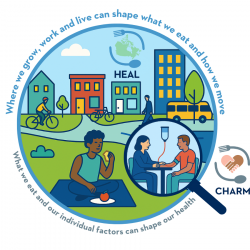The Langille and PAC (Keats/Grandy) labs will be well represented at the Canadian Conference for Cancer Research. Dr. Morgan Langille is the Canada Research Chair in Human Microbiomics and an associate professor in the Departments of Pharmacology, and Microbiology and Immunology at Dalhousie University. He leads the Langille Lab which strives to better understand the role of the microbiome in various diseases by developing and testing novel bioinformatic methods. Dr. Robyn Wright is a postdoctoral research fellow in the Langille Lab who is interested in microbial ecology/microbial community dynamics in natural and synthetic systems and how these respond to change, as well as mitigating anthropogenic impacts on the environment. Dr. Wright will be presenting in a concurrent session on linking tumour, blood and oral microbiomes with cancer outcomes on Monday, November 13th at 4:40pm. The session on the Gut Microbiome for Precision Oncology will be chaired by Dr. Bertrand Routy (CHUM/CRCHUM) and Patient Partner, Darren Frew. Dr. Vanessa DeClercq will also be in attendance at the conference. Dr. DeClercq is a Research Associate in the Langille Lab and holds an Adjunct appointment in Department of Community Health & Epidemiology at Dalhousie University. Dr. DeClercq is an Associated Researcher and former Research Scientist with Atlantic PATH. Her research interests include the role that lifestyle behaviour, such as diet and activity, play in chronic disease prevention and management. ***** The Physical Activity for Persons Living with or Affected by Cancer (PAC Lab) will be well represented at the upcoming Canadian Cancer Research Conference. The PAC Lab is directed by Atlantic PATH’s colleagues, Dr. Melanie Keats and Dr. Scott Grandy. Dr. Melanie Keats is a Professor in the School of Health and Human Performance, Division of Kinesiology, Dalhousie University. She holds a research appointment with the Division of Medical Oncology with Nova Scotia Health, Co-Chairs the Physical Activity and Cancer Care Standards Working Group with the Nova Scotia Cancer Care Program, and is a Senior Research Scientist with the Beatrice Hunter Cancer Research Institute. Dr. Keats’ research takes an interdisciplinary approach to better understanding the role of exercise in improving the quality of life of cancer survivors. Dr. Scott Grandy is an Associate Professor in the School of Health and Human Performance, Division of Kinesiology, Dalhousie University. He holds a research appointment with the Division of Medical Oncology with Nova Scotia Health and is a Senior Research Scientist with the Beatrice Hunter Cancer Research Institute. Dr. Grandy’s research interests include kinesiology, and cardiovascular disease and exercise, disease prevention, and aging. Tom Christensen, MSc is the Research Coordinator and Senior Clinical Physiologist in the PAC Lab. Tom will present a poster on missed opportunities in supporting informal cancer caregiver (and patient) health. Posters will be up for the duration of the conference and during viewing sessions on Sunday, November 12th from 12-1:30pm AST and Monday, November 13th from 1:10-2:40pm AST. Tom will also present this work in the lightning session in a panel on Cancer Survivorship on Sunday, November 12th at 1:30pm AST. Jodi Langley, Msc is a doctoral candidate in the School of Health and Human Performance at Dalhousie University. Jodi will present a poster on the associations among referral source, enrollment, and adherence to an exercise oncology program for individuals in rural and remote communities in the EXCEL study. Posters will be up for the duration of the conference and during viewing sessions on Sunday, November 12th from 12-1:30pm AST and Monday, November 13th from 1:10-2:40pm AST. Steph Kendall, MSc, completed her Master’s research with supervisor, Dr. Grandy. A poster will be presented focused on altered lipid-based metabolites as early markers of anthracycline-induced cardiotoxicity and the cardioprotective benefits of physical activity in breast cancer patients. Posters will be up for the duration of the conference and during viewing sessions on Sunday, November 12th from 12-1:30pm AST and Monday, November 13th from 1:10-2:40pm AST. Dr. Stefan Heinze is a postdoctoral fellow with the PAC Lab and the Nova Scotia Health Authority’s Cancer Care Program working towards integrating exercise and physical activity programming as a standard of care. In addition, he has helped to introduce the measurement of frailty into the PAC Lab’s research. He is interested in how we can use frailty assessments to help decide upon the best care pathways for each person living with a cancer diagnosis. Dr. Heinze will present a poster on activating cancer communities through an exercise strategy for survivors (ACCESS), an implementation-effectiveness study of a 12-week multimodal exercise program for people living with cancer. Posters will be up for the duration of the conference and during viewing sessions on Sunday, November 12th from 12-1:30pm AST and Monday, November 13th from 1:10-2:40pm AST. *Photo Credit: Dalhousie University







